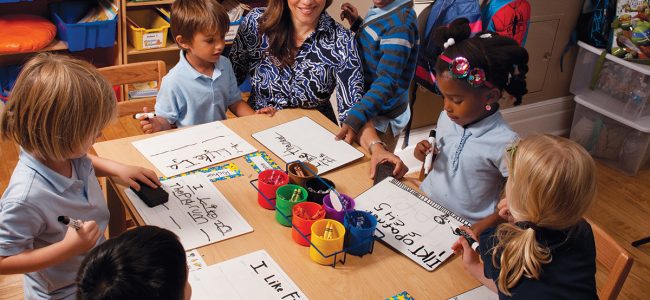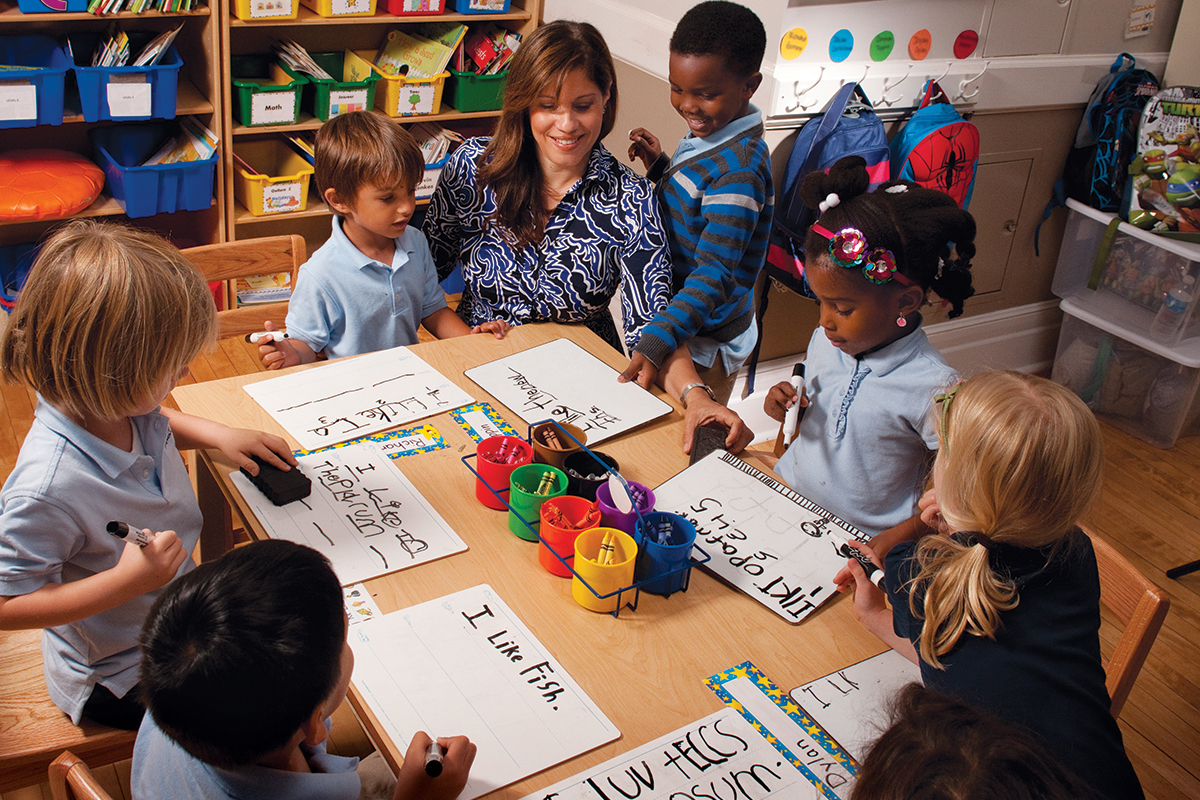
In the realm of early childhood education, cognitive development takes center stage as a crucial aspect that shapes young minds. It’s a journey where children embark on an adventure of learning, exploration, and discovery, laying the foundation for their future academic and life successes.
This discourse delves into the myriad benefits of early childhood education for cognitive development, exploring how it empowers children with essential skills and knowledge that will serve them well throughout their lives.
Research has consistently shown that children who participate in high-quality early childhood education programs exhibit remarkable cognitive advantages compared to their peers. These benefits extend beyond the classroom, positively impacting their overall well-being and setting them on a path towards lifelong success.
Social-Emotional Development
Early childhood education lays the foundation for children’s social-emotional development, which encompasses their ability to understand and manage their emotions, build relationships, and interact with others in positive ways.Social-emotional growth in young children is essential for their overall well-being and success in life.
It helps them develop empathy, self-regulation, cooperation, and problem-solving skills.
Activities for Promoting Social-Emotional Skills
Early childhood education programs incorporate various activities that foster social-emotional development in young children. These activities include:
- Circle time:Children gather in a group to share stories, sing songs, and engage in discussions that promote social skills, emotional awareness, and cooperation.
- Role-playing:Children pretend to be different characters and act out scenarios that help them understand different perspectives, develop empathy, and resolve conflicts.
- Cooperative games:Children work together to achieve a common goal, which encourages teamwork, communication, and problem-solving skills.
- Art and music activities:These activities provide opportunities for self-expression, emotional regulation, and collaboration.
By engaging in these activities, young children develop the social-emotional skills that are essential for their success in school, relationships, and overall well-being.
Physical Development
Early childhood education plays a crucial role in fostering children’s physical development. By engaging in various activities, children enhance their motor skills, coordination, and overall health.
Active play, such as running, jumping, and climbing, promotes gross motor development. These activities strengthen muscles, improve balance, and enhance coordination. Outdoor activities, like playing in the park or exploring nature, provide opportunities for children to engage in physical play while also benefiting from fresh air and sunlight.
Healthy Nutrition
Healthy nutrition is essential for physical well-being. A balanced diet provides children with the necessary nutrients to support their growth and development. Early childhood education programs that incorporate nutrition education and healthy meal options help children develop healthy eating habits that can last a lifetime.
Educational Foundations
Early childhood education plays a crucial role in shaping a child’s future academic success by fostering the development of literacy, numeracy, and critical thinking skills. These skills provide a solid foundation for kindergarten and beyond, equipping children with the necessary tools for lifelong learning.
Through engaging activities and experiences, early childhood education programs nurture children’s language and literacy skills. Storytime, shared reading, and letter recognition activities introduce children to the world of books and language, fostering their vocabulary, comprehension, and writing abilities.
Literacy
- Shared reading: Reading stories aloud to children stimulates their imagination, develops their vocabulary, and introduces them to different literary styles.
- Letter recognition: Engaging children in activities that involve identifying and matching letters helps them develop phonemic awareness and prepare for reading.
- Writing practice: Providing opportunities for children to scribble, draw, and write their own stories encourages their creativity and fine motor skills.
Early childhood education also emphasizes numeracy skills, introducing children to basic math concepts and problem-solving. Counting games, shape sorting, and measuring activities help children develop their understanding of numbers, quantities, and spatial relationships.
Numeracy
- Counting games: Engaging children in counting songs, games, and activities strengthens their number recognition and counting abilities.
- Shape sorting: Providing children with opportunities to sort and classify shapes helps them develop their spatial reasoning and problem-solving skills.
- Measuring activities: Introducing children to measuring tools and activities allows them to explore concepts of size, volume, and comparison.
Furthermore, early childhood education fosters critical thinking skills by encouraging children to ask questions, explore their surroundings, and make connections. Hands-on experiments, problem-solving activities, and open-ended discussions stimulate children’s curiosity and analytical abilities.
Critical Thinking
- Hands-on experiments: Conducting science experiments and engaging in hands-on activities allow children to explore cause-and-effect relationships and develop their problem-solving abilities.
- Problem-solving activities: Presenting children with puzzles, riddles, and problem-solving games encourages them to think creatively and find solutions.
- Open-ended discussions: Facilitating discussions that allow children to share their ideas, ask questions, and engage in critical thinking promotes their ability to analyze and synthesize information.
By laying a strong foundation in literacy, numeracy, and critical thinking skills, early childhood education empowers children with the tools they need to succeed in kindergarten and throughout their academic journey.
Long-Term Outcomes
Early childhood education has lasting positive effects that extend well beyond the preschool years. Studies have consistently shown that children who participate in high-quality early childhood programs experience numerous long-term benefits, including:
- Improved educational attainment
- Higher earning potential
- Reduced risk of social problems
Improved Educational Attainment
Research has found that children who attend early childhood education programs are more likely to succeed in school. They have higher reading and math scores, are more likely to graduate from high school, and are more likely to attend college.For example, a study by the National Institute for Early Education Research found that children who participated in a high-quality early childhood program were 44% more likely to graduate from high school and 28% more likely to attend college than children who did not participate in such a program.
Higher Earning Potential
Early childhood education also has a positive impact on earning potential. Studies have found that adults who participated in early childhood education programs earn more money than those who did not.For example, a study by the HighScope Educational Research Foundation found that adults who participated in the HighScope Perry Preschool Project earned an average of $10,000 more per year than adults who did not participate in the program.
Reduced Risk of Social Problems
Early childhood education can also help to reduce the risk of social problems. Studies have found that children who participate in early childhood education programs are less likely to engage in risky behaviors, such as crime and drug use. They are also more likely to have positive social relationships and to be successful in the workplace.For example, a study by the Centers for Disease Control and Prevention found that children who participated in Head Start were less likely to be arrested for a crime as adults and were more likely to have a job.
Equitable Access
Ensuring that all children have equal access to high-quality early childhood education is crucial for their cognitive development and future success. However, socioeconomic disparities and other barriers often limit access to these programs for children from disadvantaged backgrounds.
Promoting equity in early childhood education requires addressing challenges such as:
Funding and Resources
- Providing adequate funding to support high-quality early childhood programs in underserved communities.
- Ensuring that resources are allocated equitably to meet the diverse needs of children.
Accessibility and Transportation
- Expanding program availability in areas with limited access.
- Providing transportation services to ensure children can attend programs regardless of location.
Cultural Sensitivity and Inclusion
- Creating programs that are culturally responsive and welcoming to children from all backgrounds.
- Providing training and support for educators to promote inclusive practices.
Parent Engagement
- Empowering parents as partners in their children’s education.
- Providing resources and support to help parents navigate the early childhood education system.
Best Practices
To maximize the benefits of early childhood education, it is essential to implement best practices that promote optimal child development. These practices include maintaining appropriate teacher-to-child ratios, employing qualified staff, and offering developmentally appropriate curricula.
Additionally, fostering parent involvement and establishing community partnerships are crucial for supporting early childhood education and ensuring its long-term success.
Appropriate Teacher-to-Child Ratios
Research consistently demonstrates that lower teacher-to-child ratios lead to improved child outcomes. Smaller group sizes allow teachers to provide individualized attention, cater to each child’s specific needs, and foster meaningful interactions.
- For infants and toddlers (birth to 3 years), a ratio of 1:3 or 1:4 is recommended.
- For preschoolers (3 to 5 years), a ratio of 1:8 or 1:10 is considered optimal.
Qualified Staff
The quality of early childhood educators significantly impacts children’s learning and development. Teachers should possess a strong understanding of child development, effective teaching practices, and relevant curriculum content.
- Early childhood educators should hold a bachelor’s degree in early childhood education or a related field.
- They should undergo ongoing professional development to stay abreast of best practices and research.
Developmentally Appropriate Curriculum
The curriculum in early childhood education should align with children’s developmental stages and interests. It should provide opportunities for exploration, play, creativity, and social interaction.
- The curriculum should be based on research and evidence-based practices.
- It should be flexible and adaptable to meet the individual needs of children.
Parent Involvement
Parents play a vital role in their children’s early education. They can support their children’s learning by engaging in activities such as reading aloud, playing games, and providing emotional support.
- Early childhood programs should encourage parent involvement through open communication, workshops, and family events.
- Parents should be empowered to participate in decision-making and provide feedback on the program.
Community Partnerships
Collaborating with community organizations can enhance the reach and impact of early childhood education programs. Partnerships can provide additional resources, support services, and opportunities for children and families.
- Early childhood programs can partner with libraries, museums, and health clinics to offer enrichment activities and support services.
- Partnerships with businesses and community organizations can provide funding, volunteers, and mentorship opportunities.
Closure

In conclusion, the benefits of early childhood education for cognitive development are undeniable. By providing children with a nurturing and stimulating environment, we empower them with the cognitive skills and knowledge they need to thrive in school and beyond. Investing in early childhood education is an investment in our children’s future, ensuring they have the tools they need to reach their full potential and make meaningful contributions to society.
Question & Answer Hub
What are the specific cognitive skills that benefit from early childhood education?
Early childhood education fosters a wide range of cognitive skills, including attention, memory, problem-solving, language, and critical thinking.
How does early childhood education enhance language development?
Through storytelling, reading aloud, and interactive play, early childhood education programs promote vocabulary growth, grammar comprehension, and communication abilities.
Can early childhood education improve children’s social-emotional skills?
Yes, early childhood education provides opportunities for children to develop empathy, self-regulation, cooperation, and conflict resolution skills.